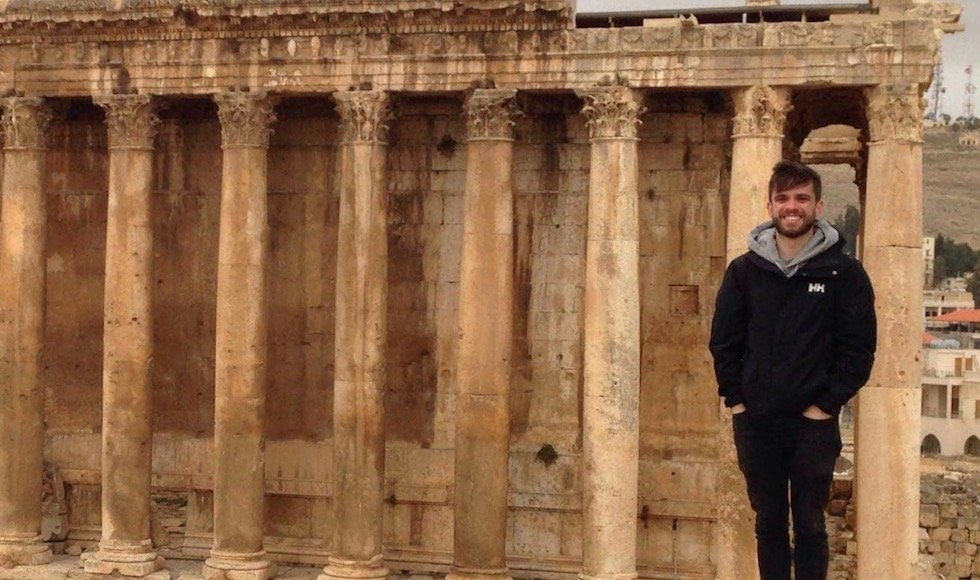Helping rebuild health systems after war

Spencer Rutherford in Lebanon , where he completed his MSc Global Health practicum
BY Ruth Adair
June 3, 2019
War is debilitating for a country’s health care system. In the aftermath of conflict, health care services stop, resources are depleted, and governance is lost. Rebuilding those health systems is a complex process that presents a significant challenge – one that MSc Global Health program graduate Spencer Rutherford aims to tackle in his research.
Rutherford’s recently published paper provides a new framework for rebuilding health systems in post-conflict countries. He hopes his recommendations will be used by organizations like the World Health Organization, the World Bank and the United Nations.
“After war, one of the big problems is a lack of government structure – typically NGOs come in and take over, and there’s no real plan for moving away from that,” Rutherford explains. “What I’ve tried to do in my research is to highlight how this can happen in a way that works.”
Some of his recommendations include constructing primary health care centres, developing strategies for decreasing reliance on external aid through raising community health funds, and transferring immunization programs from non-governmental organizations (NGOs) to ministries of health.
Drawing on case studies, Rutherford’s research centres on three post-conflict environments: Afghanistan, Cambodia and Mozambique, and evaluates the strengths and weaknesses of their approaches during the reconstruction process. With insights from academic publications, government policies and demographic data, Rutherford identifies four phases of the health system development process: the response phase, the transitional phase, the reconstruction phase and the sustainable development phase.
“It sounds obvious but what’s needed throughout all of these phases is co-ordination and communication – better ways of making sure everyone’s on the same page,” he says. With this in mind, his framework advocates for a co-ordinated approach, with an objective to promote effective and efficient policy design and implementation that involves all members of the development community throughout the reconstruction process.
What makes Rutherford’s research unique is the timeline he covers – a period of 12 years – in evaluating post-conflict health system development, as well as his examination of the health system as a whole.
“Most of the research out there looks at just one aspect of the development process over the course of a year or so,” Rutherford explains. “But the effects of conflict are long-term, so I wanted to explore a longer timeline, at all levels of the health system.”
Rutherford credits the MSc Global Health program with helping him to focus his research, which was borne from the scholarly paper he wrote as part of his course work, and informed by his research roles that followed.
After graduating from the MSc Global Health program in 2017, Rutherford was hired as a research consultant at the American University of Beirut’s Global Health Institute in Lebanon, where he had completed his field practicum as part of the global health program. Today, he divides his time as a research associate between private consulting firm Aceso Global Health Consultants and University College London (UCL).
Rutherford is excited by some of the promising aspects of global health he’s seeing in the research space, specifically a movement towards community involvement as a way of achieving more sustainable outcomes. He draws on an example of a project he is currently leading at UCL, which is investigating health factors causing infections in children under five.
“By allowing the community to have input – and taking into account what they believe is causing the infections – the idea is that we’ll be able to come up with solutions and interventions that are more sustainable.”
This notion of sustainability is core to his research on post-conflict environments, but he admits that achieving sustainable development in these environments is easier said than done.
Still, Rutherford is hopeful that the international community can take steps to ease the transition for fragile and conflict affected states by continuing to train and support health workers, provide technical assistance for the use of specialized equipment and facilitate the transfer of management to government institutions.
“I really hope that the framework we’ve developed can be used as a guidance tool throughout the reconstruction process and maybe further expanded upon through continued in-depth analyses of post-conflict countries.”


